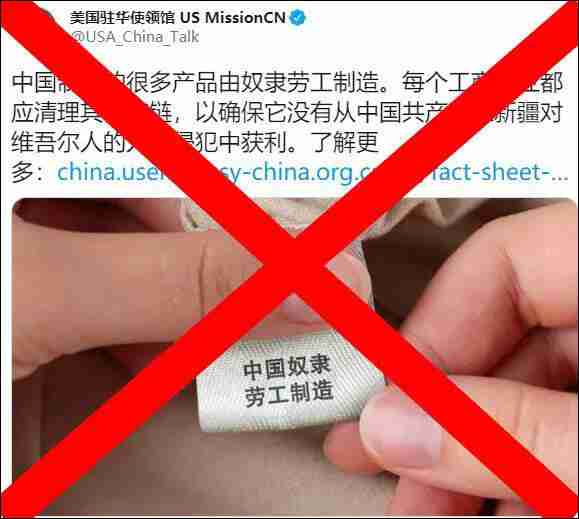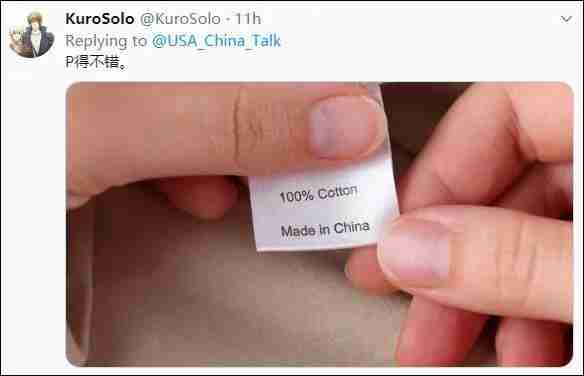

On July 12, “USA_China_Talk”, the Twitter account of U.S. Embassy & Consulates in China, used a photoshopped picture to illustrate an anti-China post. The move was seen as an attempt to spread rumors and a sign that the U.S. organization has no principle or bottom line in its efforts to defame China.

(Photo from Twitter account of U.S. Embassy & Consulates in China)
In the photo, a clothes tag which reads “Made by Slave Labor in China”, shows clear signs of having been edited for the purpose of supporting the anti-China post.

(Photo from Morgan Ortagus' Twitter page)
The post, a Chinese version of one by U.S. State Department spokesperson Morgan Ortagus, used the same photo as the original post. The only difference was that it replaced the words on the tag in the original photo with a Chinese translation through photoshopping.
The original photo was also found to have been photoshopped. A Google search indicated that the picture had been used in articles published in 2015 and 2016. However, the post by the spokesperson was tweeted in 2020.



Twitter users also discovered that the tag was very likely edited from another one which appeared in an article about tags of made-in-China goods published on Feb.27, 2016. The words “100% Cotton Made In China” were written on the tag.
The post by Morgan Ortagus quoted an announcement by the office of the spokesperson of the U.S. Department of State on July 1, which accused China of “human rights violations” in Xinjiang and other regions, including “forced labor”.
However, the announcement didn’t mention the so-called “slave labor”.
To refute the groundless accusation, China’s Ministry of Foreign Affairs on July 2 issued a document titled “What's False and What's True on China-related Human Rights Matters”. Ethnic minority workers from Xinjiang are part and parcel of the country's labor force. They have the right to be employed, sign labor contracts, obtain labor remunerations, take rest and vacations, acquire labor safety and health protection, and enjoy social insurance and welfare as prescribed by law. They have the freedom to choose their occupations. Their personal freedoms have never been restricted, said the document.
 Fire brigade in Shanghai holds group wedding
Fire brigade in Shanghai holds group wedding Tourists enjoy ice sculptures in Datan Town, north China
Tourists enjoy ice sculptures in Datan Town, north China Sunset scenery of Dayan Pagoda in Xi'an
Sunset scenery of Dayan Pagoda in Xi'an Tourists have fun at scenic spot in Nanlong Town, NW China
Tourists have fun at scenic spot in Nanlong Town, NW China Harbin attracts tourists by making best use of ice in winter
Harbin attracts tourists by making best use of ice in winter In pics: FIS Alpine Ski Women's World Cup Slalom
In pics: FIS Alpine Ski Women's World Cup Slalom Black-necked cranes rest at reservoir in Lhunzhub County, Lhasa
Black-necked cranes rest at reservoir in Lhunzhub County, Lhasa China's FAST telescope will be available to foreign scientists in April
China's FAST telescope will be available to foreign scientists in April "She power" plays indispensable role in poverty alleviation
"She power" plays indispensable role in poverty alleviation Top 10 world news events of People's Daily in 2020
Top 10 world news events of People's Daily in 2020 Top 10 China news events of People's Daily in 2020
Top 10 China news events of People's Daily in 2020 Top 10 media buzzwords of 2020
Top 10 media buzzwords of 2020 Year-ender:10 major tourism stories of 2020
Year-ender:10 major tourism stories of 2020 No interference in Venezuelan issues
No interference in Venezuelan issues
 Biz prepares for trade spat
Biz prepares for trade spat
 Broadcasting Continent
Broadcasting Continent Australia wins Chinese CEOs as US loses
Australia wins Chinese CEOs as US loses